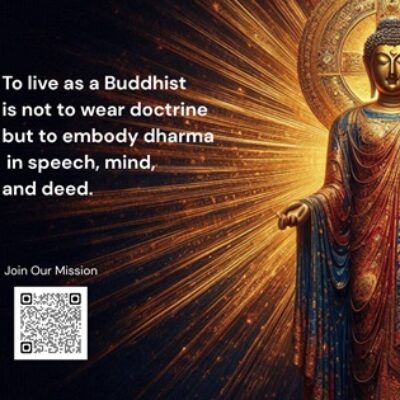“To live as a Buddhist is not to wear doctrine but to embody dharma, in speech, mind, and deed.”
To live as a Buddhist is not to collect doctrines, wear labels, or decorate ourselves with symbols. Rather, it is to let the teachings of the Buddha become flesh and blood in our daily lives. In the ancient texts, the Buddha is portrayed not as a remote figure but as a person who embodied ethical living, compassion, and wisdom. He treated others with love and respect, lived with integrity, and showed an unwavering commitment to practice, even after his awakening. His life stands as a mirror, reflecting what is possible for each of us. To embody dharma is to live in such a way that our very presence becomes a teaching.
The Dhammapada says, “Not by mere speech alone, nor by family lineage, does one become a true brahmin. He who is free from evil and wise, he is called a true brahmin.” This verse points to a universal truth: words and identities mean little if they are not supported by action. A Buddhist life is judged not by outward appearance but by how we embody the Dharma in real moments.
When we consider speech, the Buddha’s teachings are clear. The Larger Sukhāvatīvyūha Sūtra tells us that the bodhisattva “consoles the sorrowful, relieves the suffering, and benefits all beings with words of truth and harmony.” To embody Dharma in speech is to speak with compassion, honesty, and purpose, using words as medicine. Gossip, harshness, and divisive talk are easy habits, but Dharma speech is healing. It creates harmony where there is discord and uplifts those who struggle. Each time we open our mouths, we can ask: Will these words bring benefit or harm?
In mind, we are called to remember our deeper nature. The Mahāparinirvāṇa Sūtra teaches, “All sentient beings without exception have Buddha-nature.” This is not just a concept, it is the inner compass that points us toward compassion, patience, and wisdom. Zen Master Bankei spoke of the Unborn Buddha Mind, comparing it to a mirror that reflects things as they are, without grasping or rejecting. When our thoughts are guided by this mind, we do not need to cling to doctrines; instead, we discover clarity in the midst of confusion and kindness in the face of anger.
In deed, the Dharma calls us into compassionate action. The Lotus Sutra says that bodhisattvas live among people, taking on the ordinary conditions of life, so that they can guide others toward liberation. To embody Dharma in deed is to practice generosity, patience, and ethical conduct in the smallest details of life. A smile, a helping hand, or a willingness to forgive can be powerful acts of practice. Each deed becomes a ripple that touches others.
The Metta Sutta beautifully expands this vision: “Even as a mother protects with her life her child, her only child, so with a boundless heart should one cherish all living beings, whether they are near or far, great or small, seen or unseen.” This passage reminds us that to live as Buddhists is to extend compassion universally, not only to those we love but also to those who challenge us. The Buddha-nature is within every being, both blessing and challenge alike, and recognizing this reshapes how we respond to the world.
To embody Dharma means to pause and reflect each day: How can my thoughts, words, and actions be beneficial in this situation? This is the practice of Right Intention in the Noble Eightfold Path. It is also the practice of ahimsa, non-harming, the commitment to bring no harm through body, speech, or mind. In Mahāyāna Buddhism, it resonates with the Six Paramitas, the perfections of generosity, ethics, patience, energy, meditation, and wisdom. These are not abstract ideals but living practices that shape how we walk through the world.
To live as a Buddhist, then, is to let the Dharma shape every moment. It is to remember that Buddha-nature, the inner compass, shines within us and within all beings. When we allow this truth to guide us, we embody the Dharma naturally. We transform not only ourselves, but also the world around us, becoming a source of peace, healing, and awakening for others.
Written by Guiding Dharma Teacher, Rev. G.R. Lewis, M.A.
© 2025 G.R. Lewis
All rights reserved
This article is intended for personal, non-commercial use only. No part of this publication may be reproduced, distributed, or transmitted in any form without the prior written permission of G.R. Lewis, except for brief quotations used for personal study. Contact him directly via our Contact Form.
